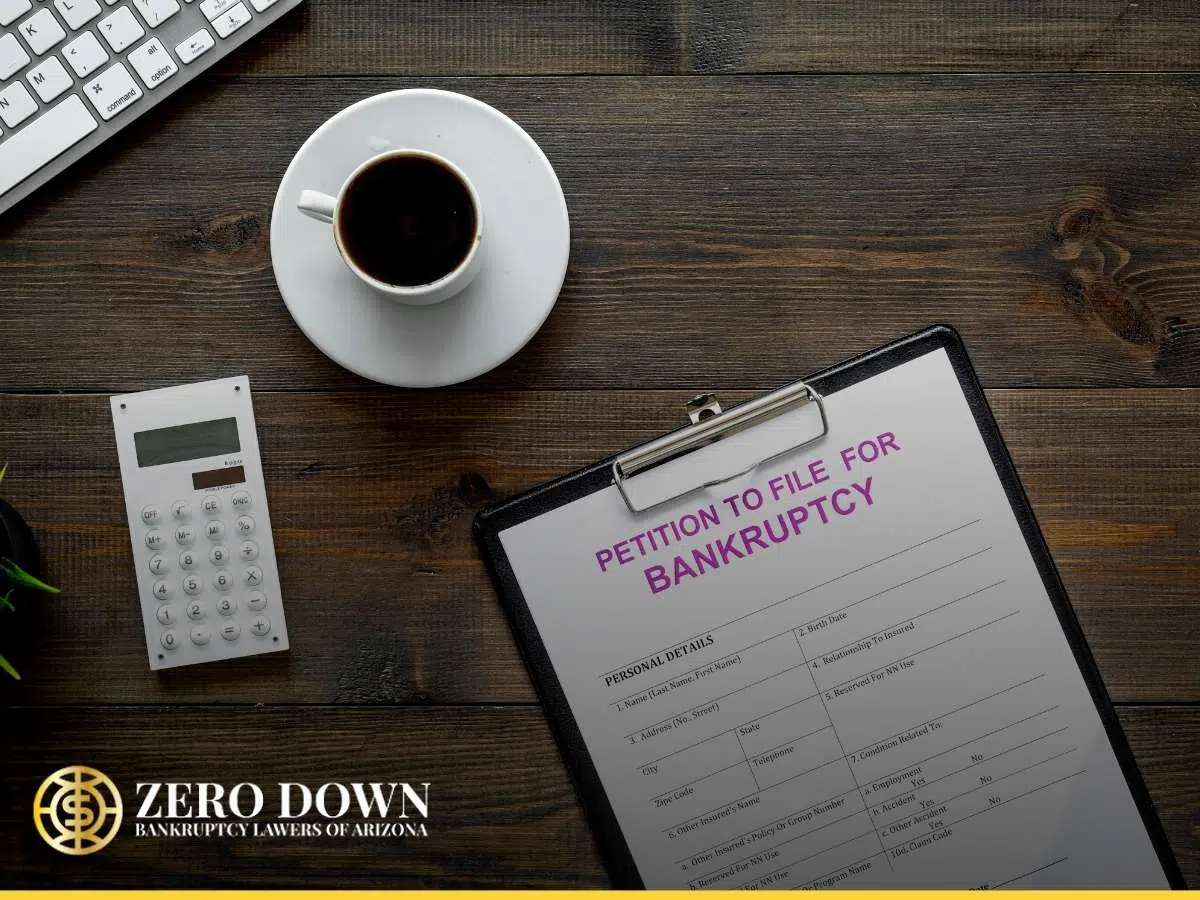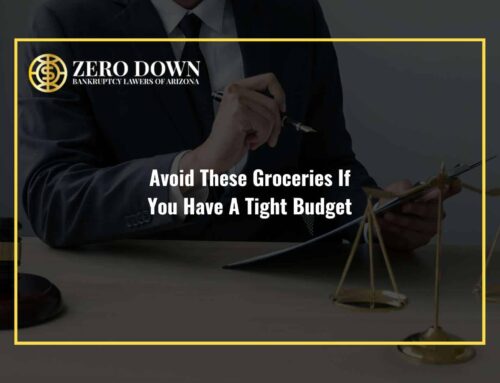When You Need to File Bankruptcy Now, But You Don’t Qualify For Chapter 7 Just Yet
Filing bankruptcy usually isn’t a decision that people decide to come to. It comes after months or years of amassing debts, creditor harassment, poor credit, and more. Filing bankruptcy can be helpful in several ways, and two of these are by clearing your debts and by activating the automatic stay. During your bankruptcy, you’re protected from repossessions, lawsuits, and more. Most individuals filing bankruptcy end up choosing either Chapter 7 or Chapter 13, with Chapter 7 being the more popular preference. But Chapter 7 bankruptcy is only available to those who meet certain income limitations. If you need to file bankruptcy now but don’t qualify for Chapter 7 bankruptcy yet, you may want to learn more about bankruptcy chapter conversion. If you have any more questions on the subject after reading this article, call our office for your free consultation at 480-448-9800.
The Automatic Stay
If you are going through an income change, you may be wondering why someone wouldn’t just wait until their income has stabilized before filing bankruptcy. The answer is that many people can’t afford to wait to enact the automatic stay. Many of our clients come to us because they have received notice that their mortgage lender is beginning the home foreclosure process, or that their wages are about to be garnished. These are just a few of the actions that the automatic stay can stop. It also stops lawsuits, evictions, utility service shut offs, repossessions of vehicles and other financed assets, and bank account levies. So, in some emergency situations, it may be worth paying for a Chapter 13 bankruptcy payment plan for a few months, then converting to a Chapter 7 bankruptcy when their average income has decreased, rather than suffer a loss like a home foreclosure. The automatic stay remains in place until the case is discharged or dismissed, unless a creditor successfully petitions the court for relief from the automatic stay.
Why Do Debtors Prefer Chapter 7 to Chapter 13?
Chapter 13 has its benefits, especially for those with relatively high income that need to work on a payment plan for secured and priority debts. Many people use it to catch up on payments for a vehicle they are about to lose to repossession, or a home they are about to lose to foreclosure. Chapter 13 bankruptcy is also the only chapter that can stop a wage garnishment from back child support. But when the bulk of your debt is in credit cards, medical bills, and other unsecured debts, Chapter 7 is usually the preferable option.
Chapter 7 clears most unsecured debts. The debtor, absent certain exceptions, won’t be required to repay any of those debts. The process takes 3 to 6 months. In comparison, Chapter 13 reorganizes debts into a payment plan. If the debtor doesn’t have enough disposable monthly income to pay off unsecured debts, they will be discharged at the end of the payment plan. However, the payment plan lasts either 3 or 5 years. Many people prefer to clear debts rather than repay them and are hesitant to enter the commitment of a 3 or 5 year legal matter.
Bankruptcy Income Qualification
There can be several obstacles keeping someone from discharging debts in bankruptcy, but one of the first is the income qualification process. There are only 2 ways to qualify for a Chapter 7 bankruptcy. The first step to either is to calculate your average monthly income during the last 6 months. You can compare your average monthly income to the Arizona state median for your family size. Only include a spouse and minor dependents in your household number. If your household income falls below Arizona’s state median, you will qualify for Chapter 7. The alternative method to qualify for Chapter 7 bankruptcy is the means test. Here, you will deduct court-approved expenses from your average monthly income to find your disposable monthly income. Disposable monthly incomes in the negative or within a certain range qualify for Chapter 7 bankruptcy.
Just because you don’t qualify for Chapter 7 bankruptcy doesn’t necessarily mean that you will qualify for Chapter 13 bankruptcy. Chapter 13 bankruptcy requires that you have sufficient income to pay off mandatory debts in your payment plan. Your payment plan will last 3 years if your income falls below the state median, and 5 years if your earnings are higher. You must be able to pay off bankruptcy costs, the full balance of your secured debts (besides your primary residence mortgage), and your priority debts in the course of your payment plan. Unsecured debts will only be paid based on how much time is left in the payment plan after the prior 3 categories have been paid. If your income isn’t enough to pay off the first 3 debt categories, your plan won’t be confirmed at your plan confirmation hearing.
Because bankruptcy qualification is on average monthly income, you may qualify for one chapter one month and a different chapter the next. For example, if someone retires, it will take a while for their average monthly income to decrease to their new income rate. That is where bankruptcy chapter conversion comes into play.
How to Convert a Chapter 13 Bankruptcy into a Chapter 7 Bankruptcy
Technically, a Chapter 13 bankruptcy can be converted to a Chapter 7 bankruptcy “at any time.” A Chapter 13 debtor planning to convert to a Chapter 7 should work with their bankruptcy attorney to determine when their average monthly income reaches the point that they qualify for Chapter 7. The debtor should file a notice of conversion with the court when they are ready to begin the process. The court will review the debtor’s case to make sure that the debtor is otherwise qualified to file Chapter 7 bankruptcy. The debtor should also pay a $25 conversion fee, which is the difference between filing fees for a Chapter 7 and a Chapter 13. The debtor should also file a statement of intentions, a form required for Chapter 7 bankruptcy but not for Chapter 13. If the court approves of the debtor’s request, the case will be converted to a Chapter 7 bankruptcy. The payment plan will cease, and the case will be discharged several weeks after the 341 Meeting of Creditors.
Arizona Bankruptcy Lawyers for Complicated Cases, Including Conversions
There are countless unique factors that could make your case more complicated than the next, and the possibility of conversion between chapters is just one of them. Unless you have previous experience in the bankruptcy industry, these types of complexities could make it almost impossible for you to file your case alone. In fact, the vast majority of Chapter 13 bankruptcies filed without an attorney fail. At Zero Down Bankruptcy Lawyers of Arizona, we have the experience and skills to make your case proceed as quickly and smoothly as possible. We also offer fair rates and low budget payment plan options starting at ZERO DOLLARS DOWN. Receive a quote for our bankruptcy legal services with your free case evaluation- call 480-448-9800 to schedule your time to speak to an experienced bankruptcy lawyer today.
Arizona Offices
Phoenix Location:
343 W Roosevelt Street, Suite #100
Phoenix, AZ 85003
Email: [email protected]
Phone: 602-609-7000
Mesa Location:
1731 West Baseline Rd., Suite 101
Mesa, AZ 85202
Email: [email protected]
Glendale Location:
20325 N 51st Avenue, Suite #134
Glendale, AZ 85308
Email: [email protected]
Tucson Location:
2 East Congress, Suite #900
Tucson, AZ 85701
Email: [email protected]










